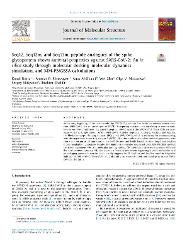| dc.contributor.author | Dutta, Kunal | |
| dc.contributor.author | Elmezayen, Ammar D. | |
| dc.contributor.author | Al-Obaidi, Anas | |
| dc.contributor.author | Zhu, Wei | |
| dc.contributor.author | Morozova, Olga, V | |
| dc.contributor.author | Shityakov, Sergey | |
| dc.contributor.author | Khalifa, Ibrahim | |
| dc.date.accessioned | 2023-10-19T15:11:39Z | |
| dc.date.available | 2023-10-19T15:11:39Z | |
| dc.date.issued | 2021 | |
| dc.identifier.issn | 0022-2860 | |
| dc.identifier.issn | 1872-8014 | |
| dc.identifier.uri | https://doi.org/10.1016/j.molstruc.2021.131113 | |
| dc.identifier.uri | https://hdl.handle.net/20.500.12469/5149 | |
| dc.description.abstract | At the very beginning of the new decade, the COVID-19 pandemic has badly hit modern human soci-eties. SARS-CoV-2, the causative agent of COVID-19 acquiring mutations and circulating as new variants. Herein, we have found three new antiviral peptides (AVPs) against the SARS-CoV-2. These AVPs are anal-ogous to the spike glycoprotein of the SARS-CoV-2. Antiviral peptides, i.e., Seq12, Seq12m, and Seq13m, can block the receptor-binding domain (RBD) of the SARS-CoV-2, which is necessary for communicating with the angiotensin-converting enzyme 2 (ACE2). Also, these AVPs sustain their antiviral properties, even after the insertion of 25 mutations in the RBD (Rosetta and FoldX based). Further, Seq12 and Seq12m showed negligible cytotoxicity. Besides, the binding free energies calculated using MM-PB/GBSA method are also in agreement with the molecular docking studies. The molecular interactions between AVPs and the viral membrane protein (M) also showed a favorable interaction suggesting it could inhibit the viral re-packaging process. In conclusion, this study suggests Seq12, Seq12m, and Seq13m could be helpful to fight against SARS-CoV-2. These AVPs could also aid virus diagnostic tools and nasal spray against SARS-CoV-2 in the future. (c) 2021 Elsevier B.V. All rights reserved. | en_US |
| dc.description.sponsorship | Council of Scientific and Industrial Research (CSIR); New Delhi, India [09/599(0082)/2019-EMR-I] | en_US |
| dc.description.sponsorship | Council of Scientific and Industrial Research (CSIR), Govt. of India, New Delhi, India is sincerely acknowledged by K.D. for Senior Research Fellowship (SRF), sanction letter no. 09/599(0082)/2019-EMR-I. | en_US |
| dc.language.iso | eng | en_US |
| dc.publisher | Elsevier | en_US |
| dc.relation.ispartof | Journal of Molecular Structure | en_US |
| dc.rights | info:eu-repo/semantics/openAccess | en_US |
| dc.subject | Web Server | En_Us |
| dc.subject | Protein | En_Us |
| dc.subject | Prediction | En_Us |
| dc.subject | Affinity | En_Us |
| dc.subject | SARS-CoV-2 | en_US |
| dc.subject | spike glycoprotein | en_US |
| dc.subject | antiviral peptide | en_US |
| dc.subject | receptor-binding domain | en_US |
| dc.subject | mutation | en_US |
| dc.title | Seq12, Seq12m, and Seq13m, peptide analogues of the spike glycoprotein shows antiviral properties against SARS-CoV-2: An in silico study through molecular docking, molecular dynamics simulation, and MM-PB/GBSA calculations | en_US |
| dc.type | article | en_US |
| dc.authorid | Dutta, Kunal/0000-0002-0818-8787 | |
| dc.authorid | Khalifa, Ibrahim/0000-0002-7648-2961 | |
| dc.authorid | AL-OBAIDI, ANAS/0000-0002-6089-8188 | |
| dc.authorid | Shityakov, Sergey/0000-0002-6953-9771 | |
| dc.authorid | Morozova, Olga/0000-0002-8058-8187 | |
| dc.authorid | Zhu, Wei/0000-0002-7957-7843 | |
| dc.identifier.volume | 1246 | en_US |
| dc.department | N/A | en_US |
| dc.identifier.wos | WOS:000702899000012 | en_US |
| dc.identifier.doi | 10.1016/j.molstruc.2021.131113 | en_US |
| dc.identifier.scopus | 2-s2.0-85111268327 | en_US |
| dc.institutionauthor | N/A | |
| dc.relation.publicationcategory | Makale - Uluslararası Hakemli Dergi - Kurum Öğretim Elemanı | en_US |
| dc.authorwosid | Zhu, Wei/AFK-0930-2022 | |
| dc.authorwosid | Dutta, Kunal/C-5447-2018 | |
| dc.authorwosid | Khalifa, Ibrahim/H-8916-2019 | |
| dc.authorwosid | AL-OBAIDI, ANAS/AAU-4056-2020 | |
| dc.authorwosid | Shityakov, Sergey/H-3322-2019 | |
| dc.authorwosid | Morozova, Olga/F-6041-2012 | |
| dc.identifier.pmid | 34305174 | en_US |
| dc.khas | 20231019-WoS | en_US |
















